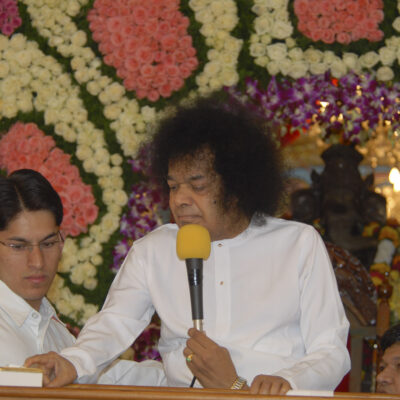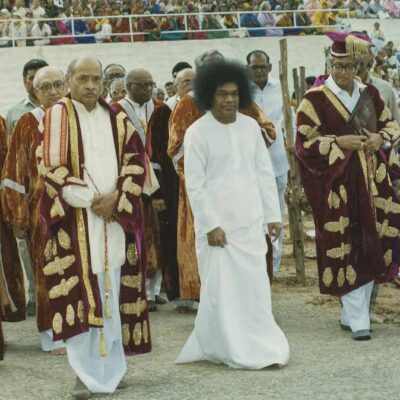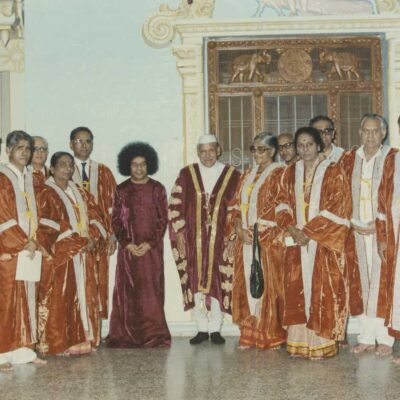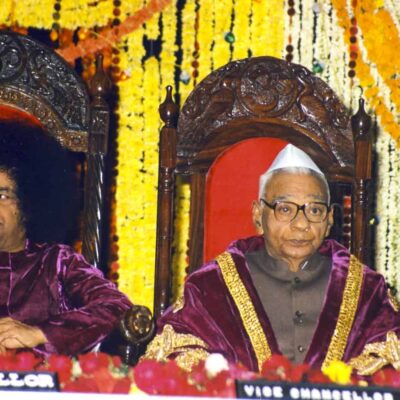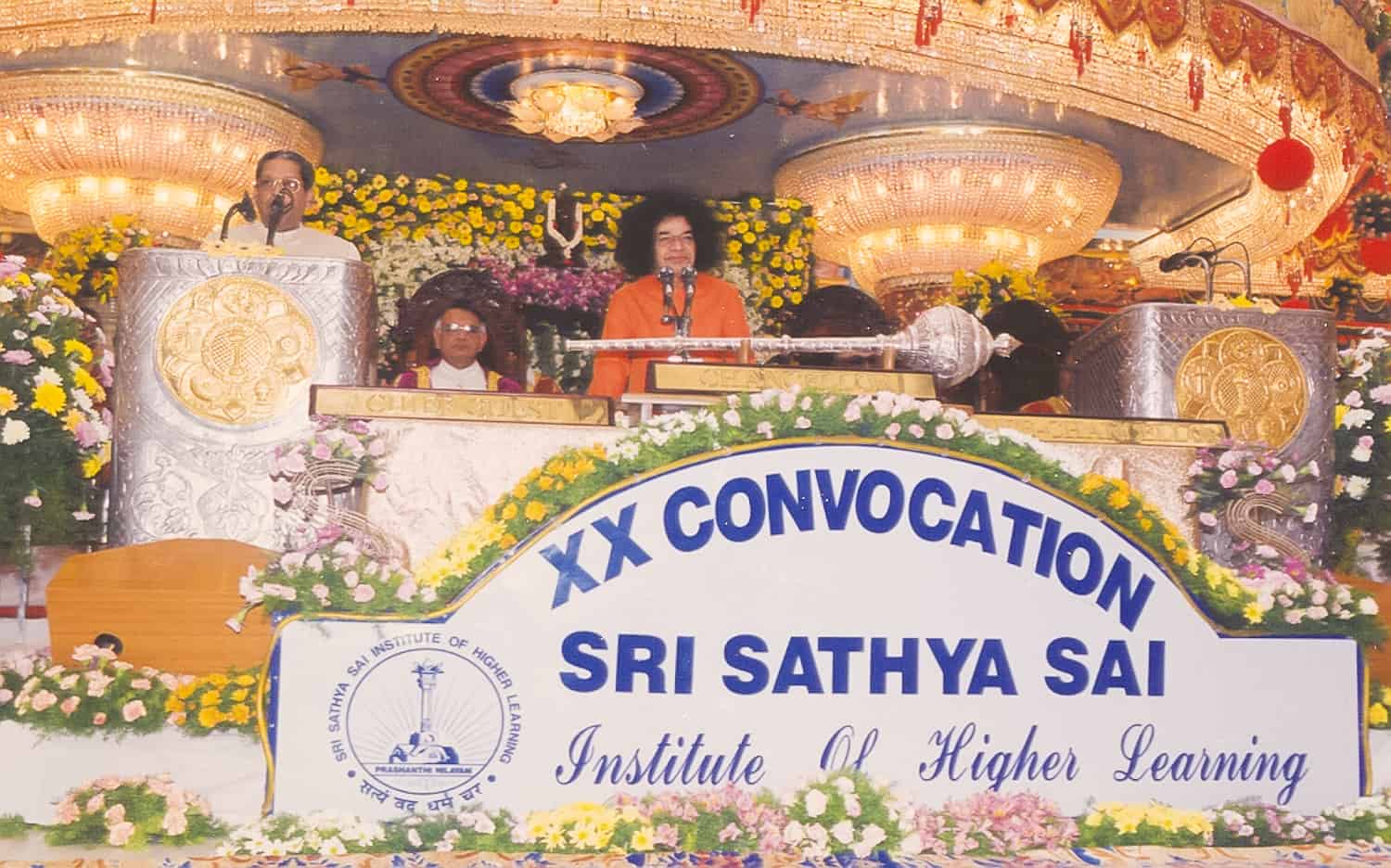
SSSIHL XX Convocation Discourse – 2001
Audio excerpt of the Divine Discourse by Bhagawan Sri Sathya Sai Baba during the SSSIHL Annual Convocation
Humility and Character are Hallmark of True Education
He alone is truly educated who works for the welfare of all beings; who is the master of all forms of knowledge, and who is the paragon of all virtues.
(Sanskrit Sloka)
Embodiments of Love!
If education is not used for the welfare of society, it is no education at all. Man can be called truly educated only when his education benefits people at large and he becomes recipient of their love. It is not enough if one merely acquires bookish knowledge, one should cultivate all virtues and attain supreme wisdom. True education is that which bestows on man the wealth of morality, spirituality and character. The purpose of education is not merely to sustain the body; it should broaden the mind and make the human being an ideal and a virtuous one.
Character – need of the hour
If one enquires deeply, one will be confused with the problems that are afflicting the field of education today. Under these circumstances, students should make efforts to understand the purpose of education and act accordingly. Man today has made a great progress in the field of science and technology, but that should not make him egoistic. Science and technology is related to worldly education. What man needs is good character. Worldly education cannot foster virtues in man. The one who sets an ideal to society by his virtues and conduct alone is truly educated. The modern student is trying to master various forms of knowledge, but he is unable to understand the nature of his body and the mind. The same was said by Winston Churchill once, “Man has conquered all, but has not conquered himself.” The modern man knows everything, excepting himself. To know one’s own self is positive and to know about the world is negative; together they confer peace and prosperity. It is unbecoming of an educated one to use his degrees as means to acquire jobs. One should share one’s knowledge with his fellow beings and lead an exemplary life.
One may master various forms of knowledge and win laurels in the royal court;
One may be highly valourous and vanquish the enemy in the battlefield;
One may become king of kings and rule over a vast empire;
One may give away gold and land in charity;
One may count the number of stars in the sky;
One may repeat the names of living beings on earth, but man is not able to control the body,
mind and senses, turn inward and attain the state of equanimity.
(Telugu Poem)
Education is meant for the well-being of the society
Man has travelled lakhs of miles into space and reached the moon, but is yet to find the path to travel even half an inch inward. Everyone should investigate into one’s own true nature. Ravana was in no way inferior to Rama in terms of knowledge, but Sage Valmiki, composer of the epic Ramayana, described Ravana as a fool and extolled Rama as one of wisdom. The reason is that Rama put his knowledge into practice for the welfare of the people and led an exemplary life. On the other hand, Ravana did not practise the knowledge he acquired, but became a slave to his senses and thus ruined himself and his entire clan. Education is meant not to satisfy the senses, but to make one transcend the senses and set an ideal to society. This is most essential for modern students. Only when the students put their senses to proper use, can the country attain its pristine glory. But alas! the students today do not think on these lines.
“All the ancient and eternal teachings are being misinterpreted. Sacred qualities are fast disappearing among people. Righteousness and compassion are no longer practised.
The sacred teachings of the Vedas are forgotten and wickedness is on the rise.”
(Telugu Poem)
Eschew selfishness and serve society
This is the appalling state of affairs today. All the remedial measures that are being undertaken are only making matters worse. True education is that which destroys narrow mindedness, develops equality and ultimately leads to world peace. Students should acquire such education and serve the country. People say that they are serving the country, but most of them are craving for their own selfish gains. Today man is immersed in selfishness from top to toe. One desires a handkerchief not for the sake of handkerchief but for one’s own use. Likewise, there is some selfish motive in whatever man desires. He has become a slave to his senses. He can be called truly educated only when he controls his senses. Modern students behave and act as they please. What are the qualities that are expected of a student?
“Students should pursue such education which confers on them the sacred qualities like good character, adherence to truth, devotion, discipline and duty.
(Telugu Poem)
Embodiments of Love!
You are all noble hearted and intelligent. Make proper use of your intellect. Do not allow any qualities other than love and compassion enter your heart. That which is filled with Daya (compassion) is Hridaya (heart). However, today love and compassion find no place in human heart. Consequently, wicked qualities are finding their way into it. Whatever you experience outside is nothing but the reflection, reaction and resound of what is in your heart. If your heart is filled with negative feelings, you will see only negative.
Knowledge of Atom and Atma
A deep enquiry into the principles of science and spirituality will reveal that atom is the fundamental basis of both. What is the inner significance of this? Everything in the world, the food we eat, the water we drink, the air we breathe, etc., are pervaded by atoms. You should make efforts to know the principle that is subtler than even atoms. It is from that Fundamental Principle everything has originated. Instead of trying to know the fundamental principle, man is getting carried away by the subsidiaries.
“Subtler than the atom, vaster than the cosmos, Divinity is present all over as the Eternal Witness.”
(Telugu Poem)
Here is a flower, it is but a combination of atoms. There is nothing in the world that is not made up of atoms. Birth, death and life on earth, everything is based on the principle of atoms. You should try to experience the principle of Atma, which transcends all these. In order to experience the Atma, you should pursue spiritual education along with secular education. Worldly education imparts only bookish knowledge which is but superficial knowledge. What we require today is practical knowledge. Can you know the taste of sweets like Laddu, Jilebi, etc., by merely reading their names in the books? Only when you put them on your tongue will you experience their sweetness. Likewise, you can experience bliss only by practising what you have learnt. That is practical knowledge. Today we do not find anybody truly educated as the modern system of education is based on only bookish knowledge. There are many so called educated people in our country. What is the help that they are rendering to the country? Are they involving themselves in any activity that would benefit society and make people happy? No. They are leading such a useless life that neither are they happy nor do they make others happy. Then, of what use is such education?
“In spite of his education and intelligence, a foolish man does not know his true Self and a mean-minded person can not give up his wicked qualities. Modern education leads only to argumentation, not to total wisdom. What is the use of acquiring worldly education if it does not lead you to immortality? Acquire the knowledge which is immortal.”
(Telugu Poem)
You should pursue such education which will benefit you and also society at large. There are many in society who are suffering. Enquire whether you are making any effort to alleviate the suffering of at least one of them. Your education becomes meaningless if it does not confer happiness either on you or your fellow beings.
Educated should serve society
Today students are acquiring various degrees like M.Sc., M.B.A, Ph.D., etc. But are they using them for the welfare of society? They merely fill their heads with bookish knowledge, go to the examination hall and empty their heads. No one is making any effort to know the purpose of education and its inner significance. One should know the qualities, the features and the benefits of good education. No doubt, students are intelligent and noble hearted. But they are taking to wrong ways on account of lack of proper guidance. It is the duty of parents as well as the teachers to show them the correct path. Some parents may not be educated so as to guide the students on the right path. What about the teachers in the colleges? They are bothered about their own status and do not make any effort to foster purity among students. One should understand the essence of education, put into practice and experience the bliss therein.
Education should foster humility
In the state of West Bengal, there lived a great scholar by name Ishwarchandra Vidyasagar. True to his name, he was an ocean of knowledge. He was born in a poor family. During his student days at night, he used to sit under streetlights to study, as there was no electricity at home. His mother used to shed tears seeing her son’s ordeals. He would console her saying, “Mother, Na Sukhat Labhyate Sukham (you cannot get happiness out of happiness). It is only out of difficulties can one derive happiness.” He worked hard and completed his higher studies. He also made a deep study of our ancient history and Indian glory. He was reputed for his oratorical skills. People would gather in large numbers to listen to his speeches.
Once he was invited to deliver a speech in a college in the neighbouring town. He boarded a train, in the same compartment there was an I.C.S officer who was going to the same town to listen to Vidyasagar’s speech. However, he did not recognise Vidyasagar as he had not seen him before. After they got down from the train, the officer started looking for coolie to carry his suitcase. Seeing this, Vidyasagar volunteered to carry it. Seeing the simple attire of Vidyasagar, the officer mistook him for a coolie and handed over his suitcase to Vidyasagar. He was happy that he got an opportunity to serve. He asked the officer, “Sir, where should we go?” The officer replied, “Take me to the place where Vidyasagar is going to address a meeting today. I have come all the way to listen to him.” Hearing this, Vidyasagar smiled to himself and took him to the meeting place. The officer offered him some money as coolie. Vidyasagar politely refused saying, “Sir, I have carried your suitcase only to help you, not for money.”
The meeting was about to commence. Everybody was eagerly awaiting Vidyasagar’s arrival. This officer was also among them. When Vidyasagar arrived, he was garlanded and given a grand welcome. The I.C.S instantly recognised Vidyasagar as the one who had carried his suitcase earlier in the day. The officer thought to himself, “Though Vidyasagar is highly educated, how simple and humble he is!”
One who has ego will not be respected even by his own wife and children. Vidyasagar had no trace of ego in him. He held the audience spell-bound with his speech. Time and again they applauded and expressed their appreciation. He did not exhibit his scholarship. He spoke from the depths of his heart that made a lasting impression on the people. Vidyasagar’s speech was based on his experiences in daily life and not on bookish knowledge. Even today there are many such noble personalities in Bharat. Bharat is a very sacred land, but unfortunately today, Bharatiyas themselves are not able to understand and appreciate the greatness of Bharat.
“Owing to the absence of fear of sin and love for God, humanness has declined in human beings. This is detrimental to world peace.”
(Telugu Poem)
Realise the glory of Bharat
“Forbearance is the real beauty in this sacred land of Bharat. The nectarions feeling in this country is the feeling towards one’s mother. Character is valued far higher than the very life itself. People have forgotten the basic principles of this great culture and are imitating Western culture today. The Bharatiyas are not aware of the greatness of their own cultural heritage just as a mighty elephant is not aware of its own strength.”
(Telugu Poem)
What a sacred and an ideal country our Bharat is! But alas, it is facing hardships today as Bharatiyas themselves have not understood their culture and are unable to adhere to it.
Students! Boys and Girls!
Remind yourselves of the glorious history of Bharat and its rich cultural heritage. You may not be in a position to help everybody, but alleviate the suffering of at least a few and experience the bliss derived therefrom.
After the Rangoon war, a mother and her ten-year-old son, having lost their kith and kin, somehow managed to reach Chennai. Every day the mother would go for begging alms from house to house, give most of it to her son and partake of whatever little was left. When she would not get enough, she would give the entire food to her son, and would herself go without food. As a result, her health gradually deteriorated. One day the son told her, “Mother, you have been taking care of me all along. Now it is my duty to take care of you. From today you take rest, I will bring food for both of us.” But the mother would not agree. How can a mother see her son begging? However, she had to agree on the loving insistence of her son. From then onwards everyday he would go for begging, give most of it to his mother and tell her a lie that he had already eaten. Consequently, he too became very weak.
One day he stood in front of the house of an officer and cried, “Oh sir, I am hungry, I am hungry.” The officer was relaxing in an easy chair and was going through the daily newspaper. Hearing the pitiable cries of the boy, he went inside, brought food in a leaf and told him to sit and eat. But the boy said that he would take it home. The officer said, “You seem to be lying. If you are really hungry, why don’t you sit here and eat?” The boy was too weak, felt giddy and collapsed on the ground. He was trying to say something, but could not say it loud enough as he was very weak. The officer went close to the boy and tried to hear what he was saying. The boy was saying, “First to my mother, to my mother…” With these words, he breathed his last. His love and concern for his mother were so intense that she was uppermost in his mind till his last moment. He sacrificed his very life for her sake. Even today there is no dearth of such noble sons.
Embodiments of Love!
Fill your hearts with compassion. Spare no effort to alleviate the suffering of your fellow beings. If you have ten rupees in your pocket, give at least one rupee to the needy. The culture of Bharat teaches:
Na Karmana Na Prajaya Dhanena Thyagenaike Amrutatthwamanasuhu
(Immortality is not attained through action, progeny or wealth; it is attained only by sacrifice)
Help everyone to the extent possible.
Hastasya Bhushanam Danam,
Sathyam Kanthasya Bhushanam,.
(charity is the ornament for the hand, Truth is the necklace).
These are the true ornaments that one should aspire to possess.
Students! Boys and Girls!
Develop compassion and spirit of sacrifice as would befit your education and earn a good name in society. Drive away evil tendencies like anger, hatred and jealousy. Any act of charity or service that you may undertake will prove futile if you do not give up bad qualities. Develop love, share it with others and make them happy. Only then will your education become meaningful. This is the service that you are expected to render to your motherland. You don’t need to undertake gigantic service projects or construct big schools. Serve society as per your capacity. Whatever activity you undertake, let it be suffused with love. There is no wealth greater than love.
Audio Source: Sri Sathya Sai Media Centre, Radio Sai Archives
Transcript Source: ‘Benedictory Addresses’ (Edition: May 2011), published by Sri Sathya Sai Sadhana Trust, Publications Division


